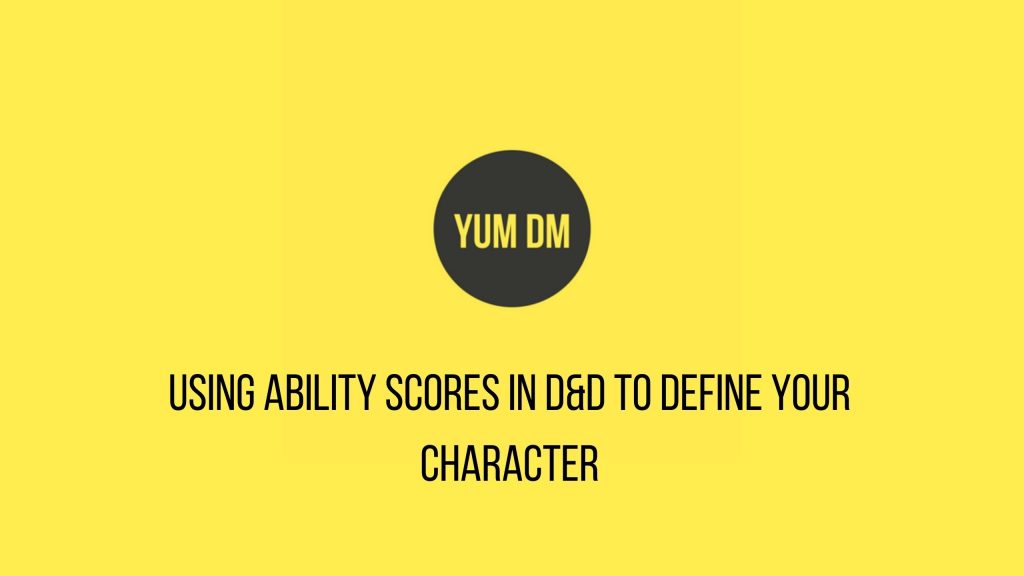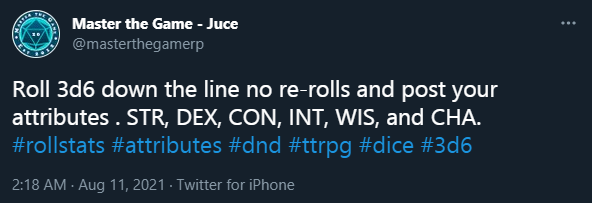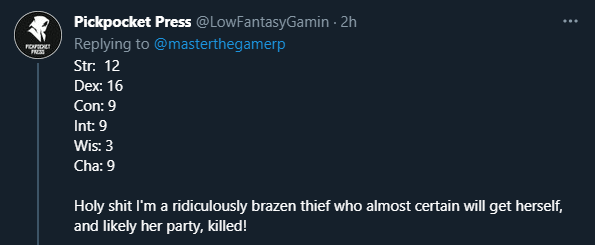
Abilities scores define your character.
Of all the various editions of Dungeons and Dragons, nothing is as standardized (well, except using a D20) as the six abilities.
No matter how you generate them (or in which order you list them), Strength, Dexterity, Constitution, Intelligence, Wisdom, and Charisma are synonymous with the game.
A while ago, I reviewed a Five Torches Deep supplement, and in that book, the creator suggested abilities were not fixed numbers but abstract notions of your experience with the wider world.
This article brings ability scores back down to earth and is about how to use those six ability scores to come up with a good understanding of your character.
Over on Twitter there was a post by Juce:

And some of the responses got me thinking how much the six abilities can help define a character.
A great example of this came from Pickpocket Press:

By just looking at the scores he rolled for his character, he figured out she was:
- Ridiculously brazen
- A Thief
How did he get this?
A high Dex made her a good thief, while a very low Wisdom score made this thief extemely prone to making bad decisions, not understanding (or caring) about the consequences.
Now, that is a character!
An Easy Task
And doing this is not that difficult.
Let’s look at another example, with ability scores I just rolled up:
Str: 10
Dex: 10
Con: 5
Int: 13
Wis: 8
Cha: 10
From these ability scores I can imediately see that my Constitution is low. Very low.
Without even knowing what class this character will be, I can already make some assumptions about him: he is not healthy.
His Wisdom is also slighty lower than average, while his Intelligence is slightly higher than normal.
I could do a few things with this character:
1. He could be overweight and unhealthy. He is smart enough to know this, but lacks the will power to do anything about it – instead, living in the moment and indulging himself at every opportunity with his one passion: food.
2. He could be old and frail, having spent most of his time at a desk copying tomes for his employer. He has gleaned some information from his years of reading and copying books and scrolls of all kinds (hence is above average intelligence), but until he took up a life of adventure (or had it thrust upon him), he never really did anything with it.
3. He nearly died at childbirth from a lung, or similar, disease. While he survived, he never fully recovered and still lives with its legacy. He took to reading as much as he could, but learned little about other people and the outside world.
These are three very different characters – all drawn from the same ability scores.
This is the power of creating what you character is like just from six numbers.
Gives You Flexibility
And this is the flexibility you have when you don’t power game and have all your abilities at high levels. Having even one that is poor, or even terrible, allows you to flesh out your character in a much more interesting way.
Someone who you look forward to roleplaying.
I would even go far as say, rolling 3D6 straight down the line (in order of ability scores) allows you to have a character that is way more interesting than one that is created via point-buy or a more generous generation method.
It also gives you an opportunity to roll the dice and let them decide what character you are going to play, while at the same time stretching your imagination in coming up with what your character is like.
But that’s not what this article is about as you can still roll badly or give your character a “dump stat” with more generous methods.
The idea is to use those ability scores to not only determine your class (and possibly race), but to also use them to flesh out your character more.
Over to You
Now it’s your turn – what ability scores did you roll and what did you create from them? Let me know in the comments below.
While You’re Here…
Since 2021 I have been publishing a monthly zine, which has a ton of articles for any edition of Dungeons & Dragons.
They are also available on DriveThruRPG and printed copies are available via my Patreon.
I also have a growing Discord, where you can join in on my regular West Marches campaign.
I will also be releasing some more products in the near future, like several monster manuals and a series of soloRPG publications.
Feel free to reach out to me on Twitter any time.
While You’re Here…
Since 2021 I have been publishing d12 Monthly, a monthly zine, which has a ton of articles for any edition of Dungeons and Dragons.
Printed copies are available in my store. The PDF is available on DriveThruRPG and you can get both, plus support my work, via my Patreon.
I will also be releasing some more products in the near future.
Feel free to reach out to me on Twitter or my contact page any time.

Ability scores are the start of defining your character, not the end. You start with ability scores but add on skills, looks, background, family, and so on. It’s a good start but more should be added to create a living breathing person.
I want to play what I want to play. I do not “roll 3d6 down the line”. I should not be forced to play a character I don’t like just because of bad die rolls. This happened once long ago when I was forced to play a Thief (I don’t like 1st edition Thieves) when I wanted to play a Wizard. I tried to have my character commit “suicide” but the DM would not let me. Played one horrible session, and I then occurred to me that I did not have to play in this campaign…A revelation for me. I want to play what I want to play.
However, I agree that high and low ability scores makes for a much more interesting character. In my campaign, a player will get to play what he wants (presuming it exists and is permitted in the world). Either players will simply choose their ability scores (my players will usually choose “sensibly”) or they roll 3d6 six times, allocate as desired then distribute 6 points, maximum of 2 on one ability score, cannot be raised above 17, then adjust for racial modifiers. This will usually result in two highs, two average, and two low ability scores.
Sounds like a neat little system. It all comes down to play style.
STR 9
INT 8
WIS 6
Dex 16
Con 9
Cha 11
Classic Thief. Agile and with great motor skills but prone to making poor decisions. Acts impulsivity, lives moment to moment
Wisdom if 6! Love it. Great character.
Str 12
Dex 15
Con 15
Int 12
Wis 16
Cha 11
Healthy, agile, world wise but not as book smart she is reclusive and very shy life has not been kind to her as a failed marriage left her with a child to raise, but raise him she did only to outlive him.
She is now trying to track down her grandchild after events left her stranded far from home, but she persists in her search.
Sorry pictured her as an uncharismatic Gwendoline Christie was wondering if the first paragraph was a fair description?
Nice! To be honest I had to Google who Gwendoline Christie was (not a big fan of GoT – I know, the only one right?), but that’s cool. Nice rolls by the way – I would be happy with 12 Intelligence! 🙂
Thanks for leaving a comment and no need to be sorry.
Str 12
Dex 8
Con 12
Int 6
Wis 9
Cha 7
Based on these stats I can already tell my character has spent some time on the farm working hard. Tossing bales of hay by day building up his strength. He walks a around the farm a lot and works up a hearty appetite in time for dinner, thus the high constitution. I can see he doesn’t spend a lot of time reading books as that is not important to him. Perhaps he has trouble reading small print and big words. His low charisma tells me he doesn’t leave the farm much and is withdrawn and is less a people person and prefers the company of his farm animals. Even the animals can tell he is a bit grumpy at times. He resents being on the farm and is tired of the life is family has chosen for him, thus his reason for taking up an adventure. Perhaps he travels to the nearest big city and takes up the job as a towns guardsman or as a hired muscle. Maybe he is a part of the local town Auxiliary and helps out the sheriff as needed while still on the farm.
Okay now I so want to play a D&D game based on this method! Maybe I can convince my players to try this just once?
This is awesome! It would be great to have each player do this first and come up with a backstory before they jump into choosing a race/class – it wouldn’t take long and it is a good way to get the creative juices flowing.
A great character by the way!
STR: 13
INT: 8
WIS: 11
DEX: 9
CON: 13
CHA: 9
This is either a human farmer who became a fighter, or a dwarf, according to my B/X Basic Rulebook.
I’ve played a lot of farmers-turned-fighters, so I’ll go with Dwarf this time. I will name him Davrock Ironbeard.
He’s an adventurer because a dragon wiped out his clan and left him homeless. Hopefully he’ll find a group of other adventurers who will join him as he seeks gold and glory.
Love it!
With Str and Con as your high abilities, it really needs to be a fighter. 🙂